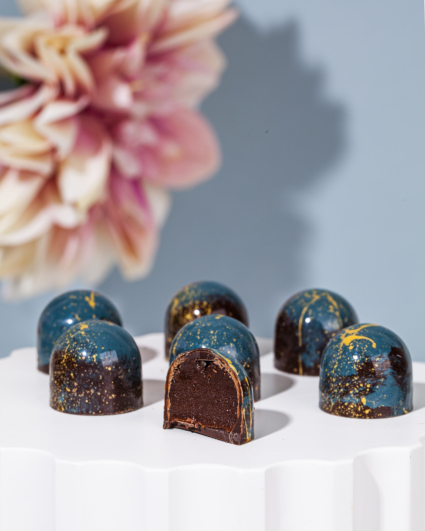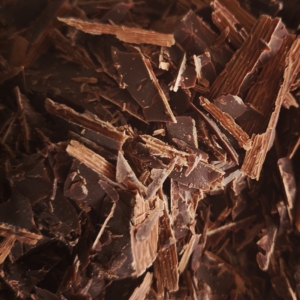Fragrances
Confections
Candles
Gift Sets
Pets


Do you really know what’s in your dark chocolate? We’re proud to share what’s in ours. Our chef crafted bonbons are created with Noel Royale Dark Chocolate 64%, a French brand that’s milled in a several hundred year old chocolate factory in the Italian alps. Single origin, non-conflict, vegan, and considered among the best chocolates in the world by some of the best chefs in the world. Moreover, we’re proud to disclose that unlike dozens of other brands, our dark chocolate has untraceable amounts of four dangerous toxins including lead, cadmium, mercury and arsenic.
A recent investigation by Consumer Reports tested dozens of well-known dark chocolate bars for heavy metals. They tested 28 dark chocolate bars from the following brands: Hershey’s, Ghirardelli, Lindt, Dove, Godiva, Trader Joe’s, Hu, Mast, Taza Chocolate, Valrhona, Beyond Good, Equal Exchange, Scharffen Berger, Alter Eco, Pascha, Tony’s, Lily’s, Chocolove, Endangered Species, Theo and Green & Black’s. They discovered that all of them contained two extremely toxic heavy metals, cadmium and lead.
Yikes.
TOXIC HEAVY METALS
A quick chemistry refresher: While cadmium may be a natural element found in soil it’s definitely not intended for human consumption. Cadmium and its compounds are highly toxic and exposure to this metal is known to cause cancer while damaging the body’s cardiovascular, renal, gastrointestinal, neurological, reproductive, and respiratory systems.
How does cadmium get into my favorite chocolate bar? This happens because cacao plants absorb cadmium that’s in contaminated soil, which then accumulates in the beans as the trees grow, similar to how heavy metals also contaminate other crops.
Moving on to lead. While lead is a naturally occurring toxic metal found in the earth’s crust it is never ever something you want to consume unknowingly.
Once lead enters the bloodstream, it travels to soft tissues including the liver, kidneys, lungs, brain, spleen, muscles, and heart. It’s then deposited in our bones where it can negatively impact us for the rest of our lives.
THE NEGATIVE EFFECTS
How does lead poisoning impact our health ? It’s not a short list. Lead poisoning results in muscle and joint aches, constipation and overall fatigue. It damages our brains by interfering with how brain cells send messages and communicate. It decreases fertility in both males and females, harms our kidneys and can result in hypertension later in life. Lead prevents our bodies from creating hemoglobin – the molecule that carries oxygen in our red blood cells – resulting in anemia.
But how did lead end up in my favorite chocolate bar?
Similar to cadmium, through soil contamination which, in turn, contaminates the cacao beans that are harvested for several chocolate brands. Consistent, long-term exposure to even small amounts of these heavy metals can lead to a variety of health problems. The danger is greatest for pregnant people and young children because the metals can cause developmental problems, affect brain development, and lead to lower IQ, says Tunde Akinleye, the Consumer Reports food safety researcher who led this dark chocolate testing project.
“But there are risks for people of any age,” he says. Frequent exposure to lead in adults, for example, can lead to nervous system problems, hypertension, immune system suppression, kidney damage, and reproductive issues.
While most people don’t eat chocolate every day, 15 percent do, according to the market research firm Mintel. Even if you aren’t a frequent consumer of chocolate, lead and cadmium can still be a concern. It can be found in many other healthy foods you regularly enjoy — think sweet potatoes, spinach, and carrots – and even small amounts from multiple sources can add up to dangerous levels. That’s why it’s important to limit exposure when and wherever you can.
BENEFITS OF DARK CHOCOLATE
 Despite these unsettling findings, dark chocolate does have several potential health benefits too. Dark chocolate is loaded with organic compounds that are biologically active and function as antioxidants. These include polyphenols, flavanols and catechins, among others. Antioxidants are key to fighting harmful free radicals which stress out and damage our cells, and bodies.
Despite these unsettling findings, dark chocolate does have several potential health benefits too. Dark chocolate is loaded with organic compounds that are biologically active and function as antioxidants. These include polyphenols, flavanols and catechins, among others. Antioxidants are key to fighting harmful free radicals which stress out and damage our cells, and bodies.
According to research, the polyphenols in dark chocolate may even help lower some forms of LDL (“bad”) cholesterol when combined with other foods like almonds and cocoa. On top of all of these potential benefits, one thing is certain: Dark chocolate is delicious. Don’t worry and forego dark chocolate altogether; just be confident that your dark chocolate, like ours, is free of heavy metals.